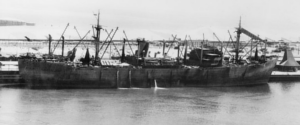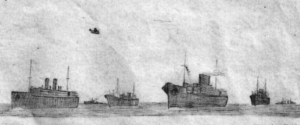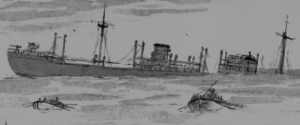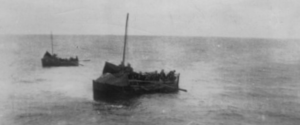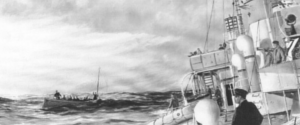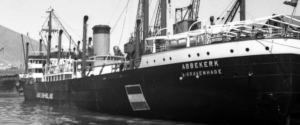
While we were still there, there was a very large number of bombers that flew over at high altitude, this time in the opposite direction, away from Singapore. We wondered about their target but luckily we heard no whistling all we wanted was to get away as quickly as possible. Our cabins which, while at anchor with no wind, had become hotter and hotter were now being cooled down by a fresh wind generated by the speed of the ship. A cooler cabin also helped to smooth our stretched-out nerves and we looked with more hope towards the future.What was in store for us? We found out soon enough!
We sailed to Oosthaven on Lampung Bay on the southernmost point of the island of Sumatra where we anchored between a couple of islands in the bay.Here it was restful. We floated peacefully in the calm, very quiet and clear waters in beautiful green surroundings. We were moored next to a gun boat from the Dutch Navy called ‘Soemba’. I can not recall whether it was there when we came or whether it arrived after us; the fact is that we were together for at least a week or so.
We received the unhappy order from Batavia that our three anti-aircraft guns, as well as the English gunners, had to be put ashore at once and transported northwards. It transpired that the Japs had already landed there. This came as a bolt out of the blue. The English soldiers were a nice group of guys and had become very much part of the crew. There was also the fact that all of a sudden we lost our entire anti aircraft capability. We were all shocked. The Captain could not change this either and so we could do nothing better than shake their hands and wish them the best of good luck.
 We had been anchored there doing nothing much at all, but not for long though. To prevent the barges in Oosthaven from falling into enemy hands we were ordered to sink them. The captain had again been in contact with Batavia to find out what in heaven’s name had to be done with the ship’s cargo because we were still loaded with ammunition in three quarters of the holds.The situation was very grim everywhere and nobody knew what to tell us. I believe that there was no use for the bombs because we did not have any aeroplanes left.
We had been anchored there doing nothing much at all, but not for long though. To prevent the barges in Oosthaven from falling into enemy hands we were ordered to sink them. The captain had again been in contact with Batavia to find out what in heaven’s name had to be done with the ship’s cargo because we were still loaded with ammunition in three quarters of the holds.The situation was very grim everywhere and nobody knew what to tell us. I believe that there was no use for the bombs because we did not have any aeroplanes left.
What or from where the final decision had come I do not know but a day later the barges came alongside this time with the order that they had to be loaded with the ammunition out of our holds, afterwards to be filled with the cooling water from the ships engines and sunk. All to be done by our own crew.
In the meantime our Captain and the Commandant from the Soemba had invited each other for special meals. A complete rijsttafel(rice table) on the Soemba and a culinary masterpiece on our ship. It was here that the chef showed somewhat more imagination than he ever did for the crew. These delicacies disappeared into the stomachs already half-filled with strong and not-so- strong liquor. The friendship became strong and long-lasting as would became clear in the future. Every other day either our Captain would tootle along in the lifeboat to the Soemba while the next day the Commandant of the Soemba would come to us in a little rowboat.
That was another story. Here came this spick and span little yacht with in the stern a spick and span commandant being rowed by a spick and span sailor. They were rowing as they row only in the navy, with short quick strokes. With every stroke the body of the Commandant went backwards a little and when he recovered the sailor made sure that with the next stroke he would bend back a little further. After watching this for a while we wondered who was actually leading this rhythm. In any case it was pretty to watch and the Commandant acted as if this was the most natural thing to do. And this was so; it was an exhibition of the age old and widely known folklore of the navy. How the man got rowed back in the middle of the night I never found out. I never woke up to watch this but it does not take much imagination to envisage it.
In the meantime all available barges, brimful with ammunition, were sunk. On the horizon we could see the smoke of the torched plantations.Again the Japs came too close for comfort. Across the whole of the Dutch East Indies there were landings and bombardments. Singapore had fallen and that was only a small part of the total operations. In all areas the Japs were superior. Resistance was nil. Everywhere there was total chaos. Only on the island of Java there were no Japs; but it was being bombed. Yet in Batavia they were thinking about us. On 17th February 1942, the message was received that we had to speed to the harbour of Tjilatjap which is on the south side of Java.
<< previous chapter ——————————————————————–next chapter >>

